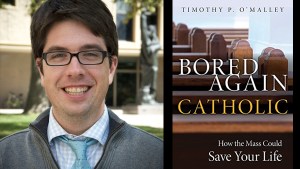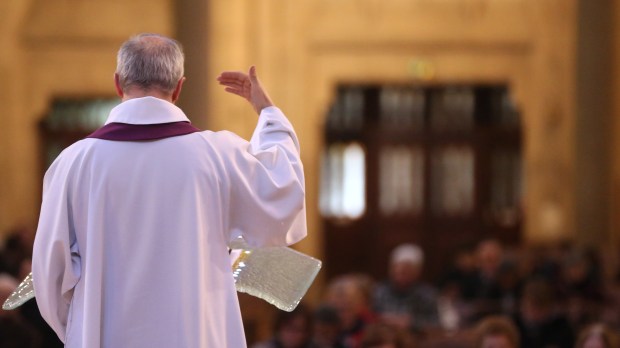Chances are you’ve had to sit through at least one uninteresting homily in your life. Just like us non-ordained folk, some priests are really great public speakers … and some aren’t.
If you look forward to the homily as the entertainment portion of the Mass (more on that later), it can be a real bummer if your parish priest isn’t a dazzling speaker.
So, how is a well-meaning Catholic to keep from daydreaming or nodding off during the homily?
#1: Prepare
Spend time studying the readings before Mass (even if the only time you have to spare is the five minutes before the opening hymn).
Familiarizing yourself with the readings will help you tune in to Mass in the same way that preparing for a lesson in school helps things stick. (You can find the readings here.) This is good practice even if you have a very charismatic priest who keeps things interesting. Scripture has been described as our “love letters from home.” Especially in the liturgy, as Vatican II explained, “in the sacred books, the Father who is in heaven meets His children with great love and speaks with them.” So get yourself ready to listen up! And prepare for what God is wanting to say specifically to you.
[Each Saturday, Aleteia offers a reflection on the Sunday Gospel. Find them here.]

Read more:
‘Bored Again Catholic: How the Mass Could Save Your Life (and the World’s Too)’
#2 Give Yourself a Job
When we are merely passive consumers it can be easy to daydream (no matter what type of speaker your priest is), so give yourself a job. Make it your business to find one thing as your takeaway. This can be a funny story, a sentence, or even one single word. Keeping your eyes peeled for the nugget gets you involved. Now you have something to do while he’s talking.
If you really want to give it your all, invest in a Mass journal and write down a couple of things for future reflection. I’m dying for the mailman to finally deliver the one I ordered from Every Sacred Sunday.

Read more:
I felt lost until Jesus placed this one word in my heart
#3 Boring Is Good
If my first two tips didn’t work and you’re finding yourself staring at your watch, I have great news: This is a good opportunity to offer it up! Why not use this small frustration for your sanctification? Jesus invites us to unite our suffering to His. Pray for your priest, pray for your fellow parishioners and pray for yourself. See how lucky you are to be bored? But now go back to Step 2 and try harder.
Read more:
“Offering it up”: Is that still a thing?
#4 Zip Your Lips
Odds are, if you’ve noticed your priest doesn’t have a knack for wowing us at the microphone, then your fellow parishioners have probably noticed, too. Keep in mind, just because you think something, doesn’t mean you should say it. If you stumble upon a person or group discussing the mundane homily, be a leader!
You can lead by touching on one of the priest’s strengths, expressing gratitude for all he does for your parish, changing the subject entirely, or remaining silent. Handle it as you see fit, but don’t engage in this type of negative conversation. Remember, giving homilies is just one small part of a priest’s responsibilities and it’s not an easy gig.

Read more:
Silence and the meaning of the Mass
#5 Get Some Perspective
When all the other tips aren’t helpful, and you’re left feeling frustrated or bored, zoom out and take a look at the big picture. Homilies were never meant to be entertainment. The priest (or deacon) delivers the homily to help us examine the readings — this time is meant to be a time of instruction and reflection.
We don’t celebrate the holy sacrifice of the Mass to be entertained. It’s not about you or me. Christ is present when the homily is dull just as He is present when the homily is particularly moving.
Do some reading about what liturgy actually is, about what’s happening at Mass and why it’s important. Bishop Barron just wrote an interesting summary you can read here. He makes a comparison that I bet you’ve never heard before, saying the Mass is “the supreme instance of play.” Yes, play, like what kids do all day long.
You could also pick up The Lamb’s Supper: The Mass as Heaven on Earth, by Scott Hahn.
Fr. Christopher Ortega, parochial vicar for St. Francis Xavier Catholic School in Georgia, says, “I suppose we don’t realize that God is always speaking to us. Especially at Mass he is communicating to us in some way. Be it the homily, one of the hymns, the readings, a thought that is triggered by the altar candles, vestment colors, the stained glass, or the incense rising up toward heaven. The Lord can use anything to speak to us, we just have to be open to listening and being actively attentive.”
LEARN MORE
What is the priest saying at Mass so softly that you can’t hear?
Why do we sometimes use the Greek words “Kyrie eleison” during Mass?
When do we bow our heads at Mass?

